Animal right advocates yesterday urged egg farmers to stop what they said was the inhumane practice of raising egg-laying hens in battery cages.
Environment and Animal Society of Taiwan (EAST) director Chen Yu-min (陳玉敏) said the nation produces 6.7 billion eggs per year and that 99 percent of the hens laying those eggs are raised in battery cages.
“About two to four hens are locked in a cage slightly larger than a piece of A4-size paper,” Chen said. “They eat, drink and live in such a small space, tread on one another and peck at each other’s feathers. They cannot even stand with their feet touching the ground.”
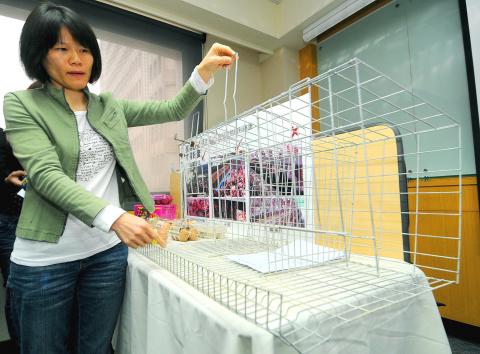
Photo: Wang Min-wei, Taipei Times
The society also screened videos showing the plight of egg-laying hens at the press conference yesterday.
EAST executive director Chu Tseng-hung (朱增宏) said that hens raised in cages could suffer from poor metabolism and weak bones, and their owners could also inject them with antibiotics or other drugs to enhance growth. He said that eggs laid by such hens could be unhealthy.
“Not only are they [the eggs] low in nutritional value, they also generate concerns over possible drug residues,” Chu said.
Chu said that hens would have much more space to move around in if they were raised in a barn or allowed to roam outdoors freely, adding that owners would also need to prepare perches for hens to sit on and a sandbox for them to take dust baths in. Only healthy hens could produce healthy eggs, he said.
Chen said that the EU has already been enforcing a battery-cage ban since Jan. 1.
She added that Europe also required that eggs sold in the retail market had to have labels showing how the hens were raised, so that consumers could choose the type of eggs they prefer.
The society also urged consumers to purchase eggs laid by hens that were not raised in battery cages. More chicken farm owners would be motivated to abandon the inhumane practice if their eggs remained unsold.
However, officials from the Council of Agriculture said that more than 1,700 egg farmers around Taiwan would be affected directly, should the nation decide to launch a comprehensive overhaul of how hens are raised.
“Costs will increase by NT$260 per hen if hens are raised in barns, which could be quite a burden to a lot of egg farmers,” said Chou Wen-ling (周文玲), a specialist at the council’s animal protection division.
“Currently, an egg costs between NT$2 and NT$4, but those produced in barns or on free-range poultry farms could cost close to NT$10 each, which consumers might not accept,” he added.
Chou said that it took the EU nearly 20 years to reform breeding methods for hens.
Changing consumers’ perceptions takes time, she said.
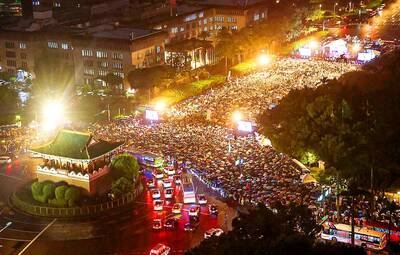
FINAL COUNTDOWN: About 50,000 attended a pro-recall rally yesterday, while the KMT and the TPP plan to rally against the recall votes today Democracy activists, together with arts and education representatives, yesterday organized a motorcade, while thousands gathered on Ketagalan Boulevard in Taipei in the evening in support of tomorrow’s recall votes. Recall votes for 24 Chinese Nationalist Party (KMT) lawmakers and suspended Hsinchu City mayor Ann Kao (高虹安) are to be held tomorrow, while recall votes for seven other KMT lawmakers are scheduled for Aug. 23. The afternoon motorcade was led by the Spring Breeze Culture and Arts Foundation, the Tyzen Hsiao Foundation and the Friends of Lee Teng-hui Association, and was joined by delegates from the Taiwan Statebuilding Party and the Taiwan Solidarity
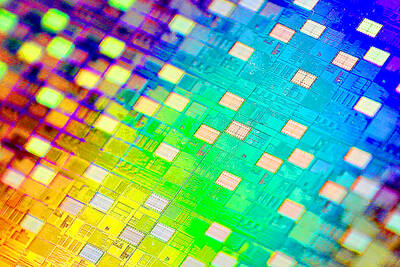
Instead of threatening tariffs on Taiwan-made chips, the US should try to reinforce cooperation with Taiwan on semiconductor development to take on challenges from the People’s Republic of China (PRC), a Taiwanese think tank said. The administration of US President Donald Trump has threatened to impose across-the-board import duties of 32 percent on Taiwan-made goods and levy a separate tariff on semiconductors, which Taiwan is hoping to avoid. The Research Institute for Democracy, Society, and Emerging Technology (DSET), a National Science and Technology Council think tank, said that US efforts should focus on containing China’s semiconductor rise rather than impairing Taiwan. “Without
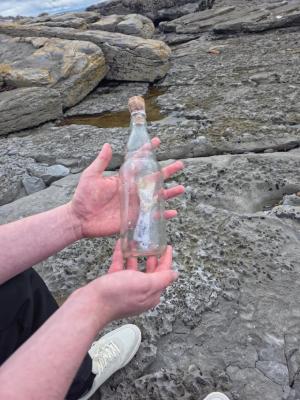
An SOS message in a bottle has been found in Ireland that is believed to have come from the Taiwanese captain of fishing vessel Yong Yu Sing No. 18 (永裕興18號), who has been missing without a trace for over four years, along with nine Indonesian crew members. The vessel, registered to Suao (蘇澳), went missing near Hawaii on Dec. 30, 2020. The ship has since been recovered, but the 10 crew members have never been found. The captain, surnamed Lee (李), is believed to have signed the note with his name. A post appeared on Reddit on Tuesday after a man
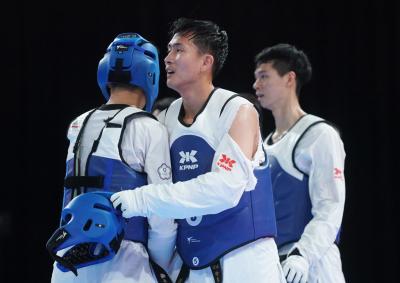
President William Lai (賴清德) today condemned an alleged attempt by two Chinese to snatch a letter of congratulations handed to Taiwan’s taekwondo team after they won silver at the Summer World University Games in Essen, Germany, yesterday. A Chinese man and woman reportedly tried to snatch a congratulatory letter to athletes Hung Jiun-yi (洪俊義), Jung Jiun-jie (鍾俊傑) and Huang Cho-cheng (黃卓乘) from the Ministry of Education, and then argued with media employees. “Why are you taking our things?” the media employees asked. “Does that say Chinese Taipei?” the two Chinese reportedly said. Following the incident, Sports Administration Director-General Cheng Shih-chung (鄭世忠) wrote on